Custom-made butcher block countertops offer a blend of practicality and aesthetic appeal, making them a popular choice for kitchens and other food preparation areas. These countertops are crafted from assembled wood strips, creating a sturdy, durable surface ideal for various culinary tasks. One of the primary advantages of butcher block countertops is their natural warmth and beauty, which can complement a wide range of kitchen styles, from traditional to contemporary. Additionally, the customization options available allow homeowners to choose the type of wood, finish, and edge profile that best suits their design preferences and functional needs.
When selecting wood for a custom-made butcher block countertop, homeowners can choose from a variety of species, each offering unique characteristics and benefits. Maple is a popular choice due to its hardness and resistance to scratches and dents. It also has a light, neutral color that can brighten up a kitchen space. Walnut, on the other hand, offers a rich, dark hue that adds a touch of elegance and sophistication. Other common wood choices include oak, cherry, and teak, each providing distinct grain patterns and color variations that can enhance the visual appeal of the countertop.
The construction of butcher block countertops can vary, with the three main types being edge grain, end grain, and face grain. Edge grain countertops are made by gluing together long, narrow wood strips with their edges facing up. This construction method is popular for its strength and stability, as well as its linear grain pattern, which creates a clean, uniform look. End grain countertops, in contrast, feature the ends of the wood strips facing up, creating a distinctive checkerboard pattern. This type of construction is particularly durable and resistant to knife marks, making it ideal for heavy-duty chopping and food preparation. Face grain countertops, though less common, display the wide face of the wood strips, offering a unique, natural wood appearance.
Customization options for butcher block countertops extend beyond wood species and construction type. Homeowners can also choose from a variety of finishes, such as mineral oil, tung oil, or polyurethane, each offering different levels of protection and sheen. Mineral oil is a popular choice for maintaining the natural look and feel of the wood while providing moisture resistance. Tung oil, derived from the nuts of the tung tree, offers a more durable, water-resistant finish and enhances the wood’s natural color. Polyurethane finishes provide the highest level of protection, forming a hard, durable surface that resists stains and scratches, but may alter the natural appearance of the wood.
The edge profile of a custom butcher block countertop can also be tailored to suit individual tastes and kitchen designs. Common edge profiles include square, eased, and bullnose edges. Square edges offer a clean, modern look, while eased edges, which are slightly rounded, provide a softer, more comfortable feel. Bullnose edges feature a fully rounded profile, adding a touch of elegance and making the countertop safer by eliminating sharp corners. These customization options allow homeowners to create a butcher block countertop that not only meets their functional needs but also enhances the overall aesthetic of their kitchen.
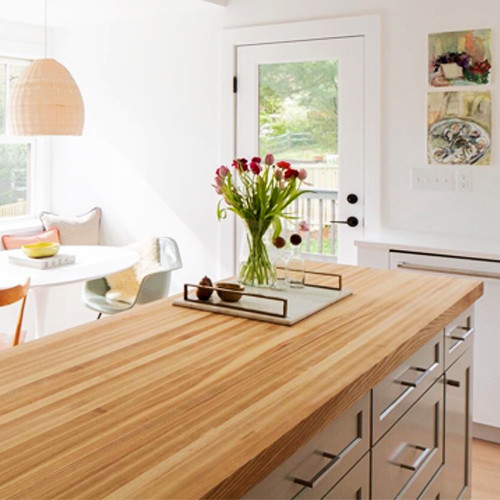
One of the key benefits of butcher block countertops is their ability to be easily repaired and maintained. Unlike other countertop materials, wood can be sanded down to remove scratches, stains, and other surface imperfections, effectively restoring the countertop to its original condition. Regular maintenance, such as oiling the surface with mineral oil or other appropriate finishes, helps to keep the wood hydrated and prevents it from drying out and cracking. This level of reparability and maintenance makes butcher block countertops a long-lasting, sustainable choice for kitchen surfaces.
In addition to their practical benefits, butcher block countertops also offer significant environmental advantages. Wood is a renewable resource, and many manufacturers source their materials from sustainably managed forests. Furthermore, the production of wood countertops generally has a lower environmental impact compared to synthetic materials, which often require significant energy and resources to produce. By choosing a custom-made butcher block countertop, homeowners can reduce their carbon footprint and contribute to more sustainable living practices.
When installing a custom butcher block countertop, it is essential to consider the compatibility with other kitchen elements. Butcher block countertops pair well with various cabinet styles, from rustic and farmhouse to sleek and modern designs. They also complement a wide range of appliances and fixtures, creating a cohesive, harmonious kitchen environment. The natural warmth and texture of wood can soften the look of stainless steel appliances and stone backsplashes, adding a welcoming, organic feel to the kitchen.
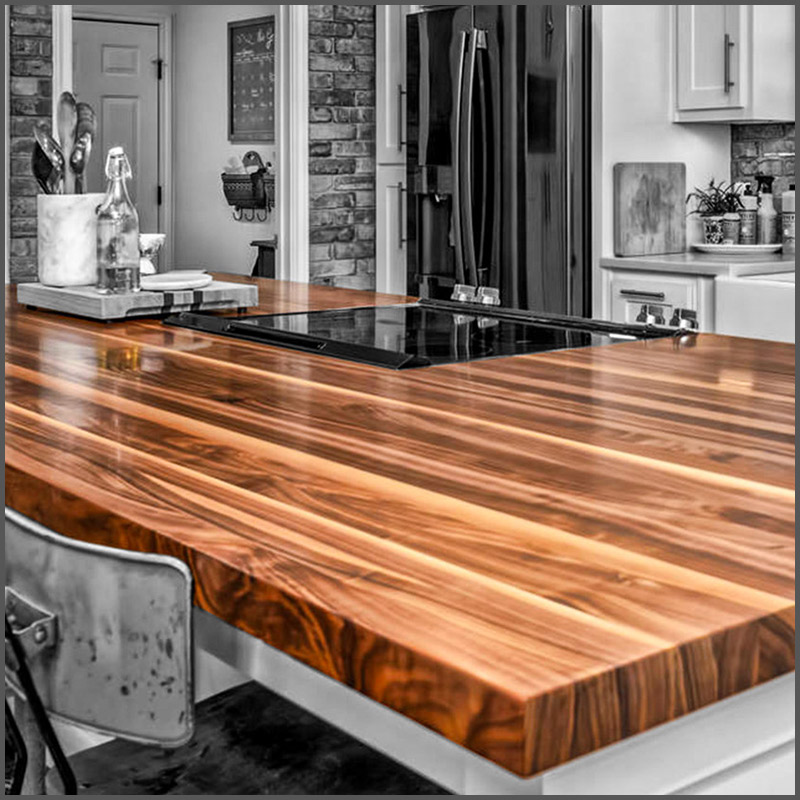
One of the considerations when opting for a butcher block countertop is its susceptibility to water damage and staining. While the wood’s natural porosity allows it to absorb moisture, which can lead to warping, staining, and mold growth if not properly sealed and maintained. To mitigate these risks, it’s crucial to apply a water-resistant finish and regularly oil the surface. Additionally, promptly wiping up spills and avoiding prolonged exposure to water can help preserve the countertop’s appearance and structural integrity.
Another potential issue with butcher block countertops is their vulnerability to heat and knife marks. While they can withstand occasional brief exposure to heat, placing hot pots and pans directly on the surface can cause burns and scorch marks. Using trivets and cutting boards can protect the wood from heat damage and knife marks, ensuring the countertop remains in good condition. Regular sanding and refinishing can also help address any surface damage that does occur over time.
Despite these considerations, the versatility and customizability of butcher block countertops make them a worthwhile investment for many homeowners. Their natural beauty and unique characteristics can significantly enhance the aesthetic appeal of a kitchen, while their practicality and ease of maintenance make them a functional choice for food preparation surfaces. By carefully selecting the wood species, construction type, finish, and edge profile, homeowners can create a custom butcher block countertop that perfectly meets their needs and complements their kitchen design.
Butcher block countertops also offer a tactile experience that other materials cannot match. The natural feel of wood under your hands while preparing food adds a sensory dimension to cooking that many find enjoyable and grounding. This tactile quality, combined with the visual warmth and beauty of wood, creates a kitchen environment that is both inviting and inspiring, encouraging creativity and enjoyment in culinary activities.
Moreover, the inherent durability and reparability of butcher block countertops make them a practical long-term investment. With proper care and maintenance, these countertops can last for decades, developing a unique patina over time that adds character and history to the kitchen. This longevity and ability to be renewed through sanding and refinishing make butcher block countertops a cost-effective choice in the long run, offering both aesthetic and functional benefits that endure.
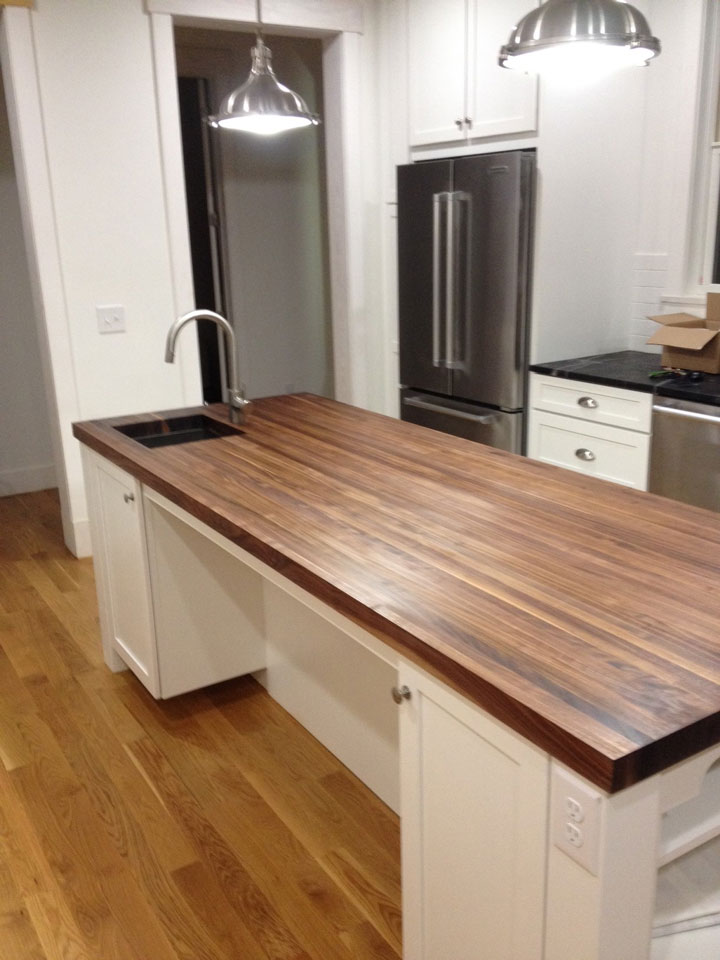
Common Mistakes to Avoid:
Ignoring Regular Maintenance: Failing to regularly oil and maintain the butcher block can lead to drying, cracking, and loss of finish. Regular care is essential to keep the wood hydrated and protected.
Improper Cleaning Methods: Using harsh chemicals or abrasive cleaners can damage the wood surface. It’s crucial to clean butcher block countertops with mild soap and water and to avoid soaking the wood.
Neglecting Sealing: Not sealing the wood can make it more susceptible to stains, moisture damage, and bacterial growth. Applying a suitable sealant enhances durability and hygiene.
Exposure to Excessive Moisture: Leaving spills or water on the surface for prolonged periods can cause warping and mold growth. Promptly wiping up any liquids helps prevent damage.
Direct Heat and Knife Exposure: Placing hot items or cutting directly on the surface can cause burns and knife marks. Always use trivets for hot items and cutting boards for chopping.
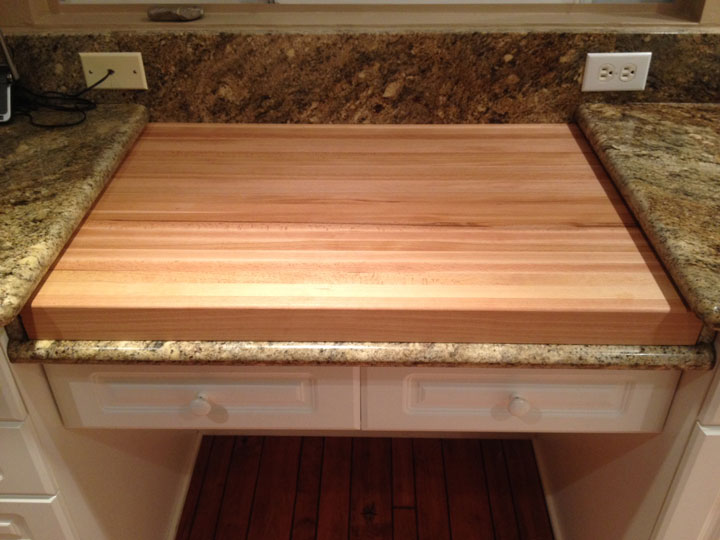
How do I maintain a butcher block countertop?
Maintaining a butcher block countertop involves regular cleaning with mild soap and water, and occasional oiling with food-safe mineral oil to keep the wood hydrated. Avoid using harsh chemicals or abrasive cleaners. Promptly wipe up any spills to prevent water damage. Every few years, sanding and refinishing the surface can help restore its appearance and remove any stains or scratches.
What wood species are best for butcher block countertops?
Popular wood species for butcher block countertops include maple, walnut, oak, cherry, and teak. Maple is valued for its hardness and resistance to scratches, while walnut offers a rich, dark color. Oak provides a classic look with distinct grain patterns, cherry adds a warm, reddish hue, and teak is known for its durability and water resistance. The best choice depends on your aesthetic preference and functional needs.
Can butcher block countertops be used around sinks?
Butcher block countertops can be used around sinks, but they require extra care to prevent water damage. It’s important to ensure the wood is properly sealed to resist moisture and to wipe up any spills immediately. Regular maintenance, including reapplying the sealant as needed, can help protect the wood from warping and mold growth. Using sink mats or trays can also help minimize water contact.
Are butcher block countertops sanitary?
Butcher block countertops can be sanitary if properly maintained. The key is to regularly clean the surface with mild soap and water and to avoid soaking the wood. Sealing the wood helps create a protective barrier against bacteria. Unlike synthetic surfaces, wood has natural antibacterial properties, and with proper care, butcher block countertops can provide a safe and hygienic surface for food preparation.
How do I repair scratches and stains on a butcher block countertop?
Scratches and stains on a butcher block countertop can often be repaired by sanding down the affected area with fine-grit sandpaper until the imperfection is removed. After sanding, the surface should be cleaned thoroughly and re-oiled or resealed to restore its finish and protect the wood. For deeper scratches or significant stains, professional refinishing might be necessary to achieve the best results.

Butcher Block Countertops

Custom Butcher Block Top – Get Pricing/Order Now Forever Joint Tops

Custom Made Butcher Block Countertop by ConnectEDcreations Wood
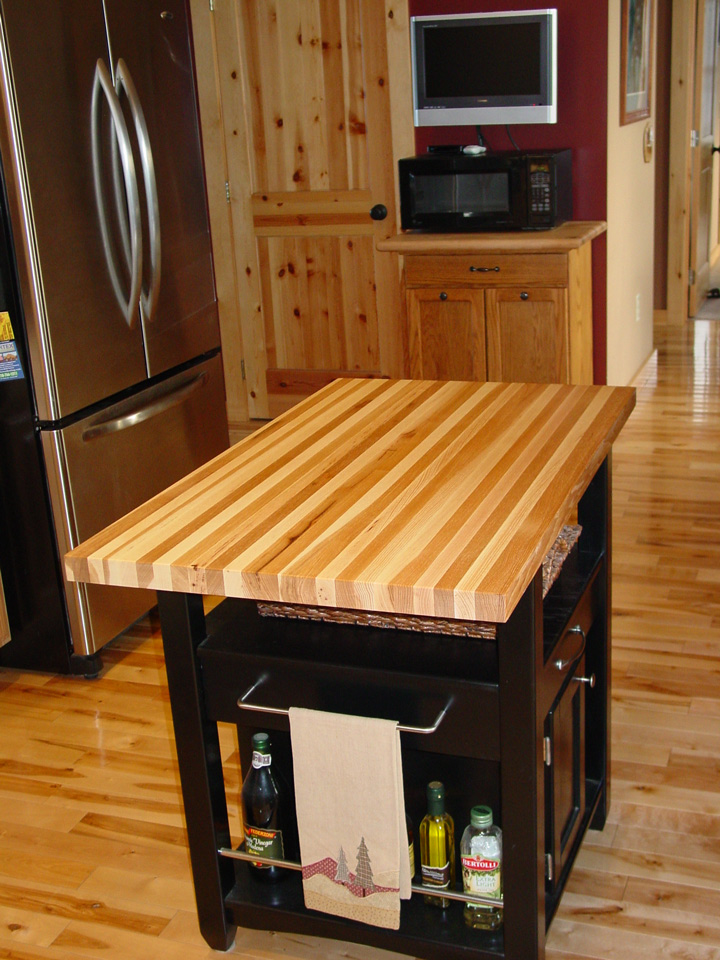
Walnut Butcher Block Counter Top
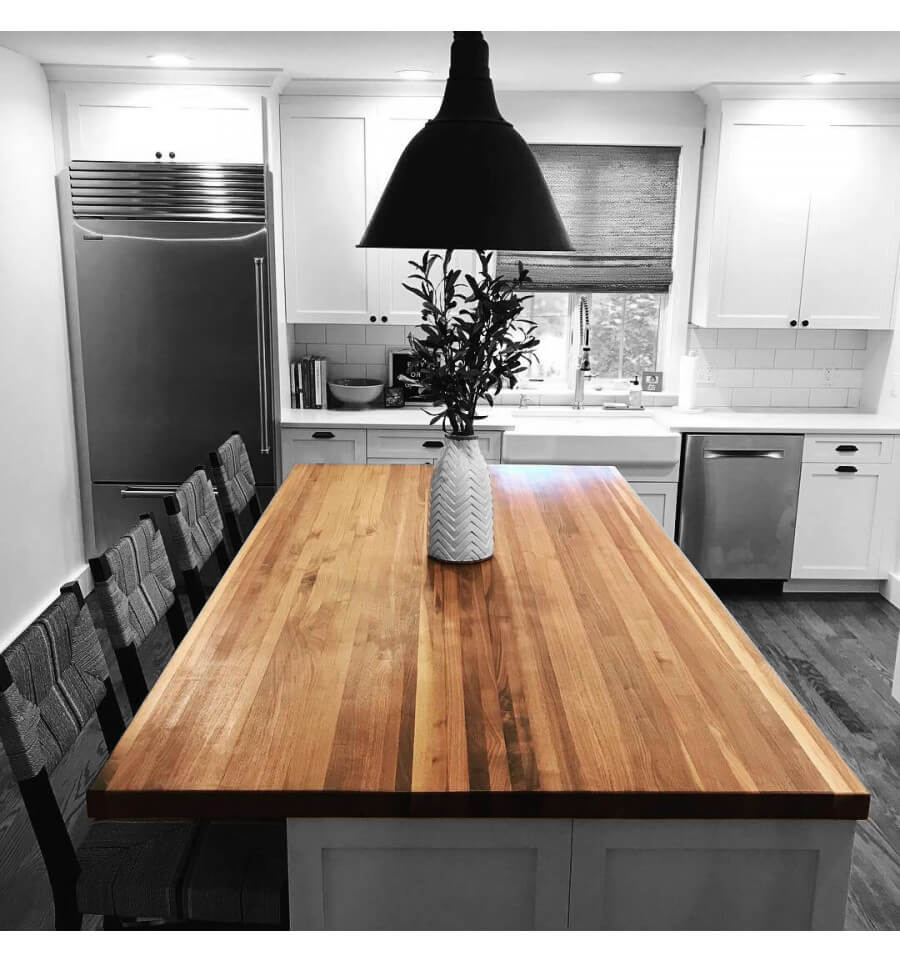
Related articles:
- Thick Butcher Block Countertop
- How To Finish A Butcher Block Countertop
- Butcher Block Countertops Sealing
- Butcher Block Countertops Redo
- Dark Stained Butcher Block Countertops
- Staining Butcher Block Countertops
- Butcher Block Countertops Mineral Oil
- How To Finish Butcher Block Countertops
- Pine Butcher Block Countertops
- Used Butcher Block Countertops